

Mobile app development is growing, can enterprises keep up? Gartner predicts that by the end of 2017, market demand for mobile app development services will grow at least five times faster than internal IT organizations’ capacity to deliver them.
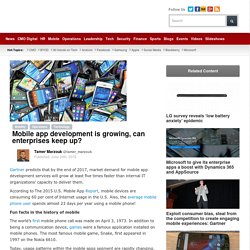
According to The 2015 U.S. Mobile App Report, mobile devices are consuming 60 per cent of Internet usage in the U.S. Also, the average mobile phone user spends almost 23 days per year using a mobile phone! Fun facts in the history of mobile The world’s first mobile phone call was made on April 3, 1973. Today, usage patterns within the mobile apps segment are rapidly changing. Related What does this mean? Usage patterns are changing, which opens the door for innovative usage scenarios. Approximately half of the 1.5 million published mobile apps are enterprise oriented. Gartner Says Demand for Enterprise Mobile Apps Will Outstrip Available Development Capacity Five to One. SYDNEY, Australia, June 16, 2015 View All Press Releases Latest Enterprise Application Trends Will Be Addressed at Gartner's Application Architecture, Development and Infrastructure Summit in Sydney, 20-21 July 2015 By the end of 2017, market demand for mobile app development services will grow at least five times faster than internal IT organizations' capacity to deliver them, according to Gartner, Inc.
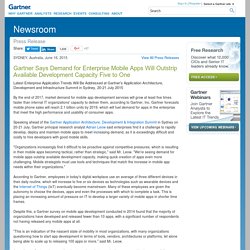
Gartner forecasts mobile phone sales will reach 2.1 billion units by 2019, which will fuel demand for apps in the enterprise that meet the high performance and usability of consumer apps. Speaking ahead of the Gartner Application Architecture, Development & Integration Summit in Sydney on 20-21 July, Gartner principal research analyst Adrian Leow said enterprises find it a challenge to rapidly develop, deploy and maintain mobile apps to meet increasing demand, as it is exceedingly difficult and costly to hire developers with good mobile skills. Mobile App Development: 8 Best Practices. Creating great mobile enterprise apps isn't necessarily easy, but it can be easier if you follow these eight critical tips. 1 of 9 If you're in enterprise IT in 2016, the odds are pretty good that you've already been tasked with building a mobile app, or that you'll get that type of project sometime in the next few months.
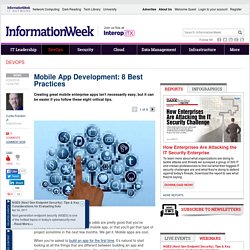
We get it. Mobile apps are cool. When you're asked to build an app for the first time, it's natural to start looking at all the things that are different between building an app and developing an enterprise application. While you're doing all that, you might well miss the really important things -- the things that will make a difference between an app that your users find delightful and an app that finds itself in the trash folder. 5 Advantages of Creating A Mobile App For Your Business. What are the advantages and disadvantages of developing apps for Android compared to developing for iOS? - Quora. Hybrid or Native Mobile App? Use the Right Tool for the Job. Visually compose APIs with easy-to-use tooling.
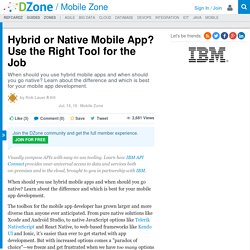
Learn how IBM API Connect provides near-universal access to data and services both on-premises and in the cloud, brought to you in partnership with IBM. When should you use hybrid mobile apps and when should you go native? Learn about the difference and which is best for your mobile app development. The toolbox for the mobile app developer has grown larger and more diverse than anyone ever anticipated. From pure native solutions like Xcode and Android Studio, to native JavaScript options like Telerik NativeScript and React Native, to web-based frameworks like Kendo UI and Ionic, it's easier than ever to get started with app development.
When we talk about leveraging mobile app development tooling and services such as those provided with Telerik Platform by Progress, your choices become much more succinct: When you use the Telerik Platform, you don't need a Mac nor do you need to manage proprietary SDKs. Forbes Welcome. Last year I wrote an article on How to Build Your First Mobile App in 12 Steps, which proved to be very popular with readers.
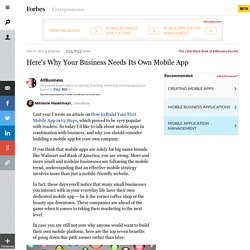
So today I’d like to talk about mobile apps in combination with business, and why you should consider building a mobile app for your own company. If you think that mobile apps are solely for big name brands like Walmart and Bank of America, you are wrong. More and more small and midsize businesses are following the mobile trend, understanding that an effective mobile strategy involves more than just a mobile-friendly website. In fact, these days you’ll notice that many small businesses you interact with in your everyday life have their own dedicated mobile app — be it the corner coffee shop or the beauty spa downtown.
These companies are ahead of the game when it comes to taking their marketing to the next level. © pathdoc – Fotolia.com 1. Statistics show that the average American spends more than two hours a day (!) 2. 3. More AllBusiness: 4. Brand. 5. How mobile applications leverage small and large business? Posted in - Mobile App Date - 07 Apr. 2014 Apple’s iPhone is considered to be one of the most popular smartphones in the market today.

The company has been successful in creating demand for its new devices year after year consistently. It has not only been a trendsetter but has revolutionized the smartphone industry. With the changing trends and increase in the use of smartphone devices, custom iPhone app development has become an important step forward for many businesses. People around the world are aware of how robust and easy-to-use iPhones are. With BYOD being adopted by many enterprises today, iOS is a great platform for businesses to start investing into. Better experience & quality The strict standards that the iOS apps need to pass to be listed on the App Store is one way that Apple pushes developers to generate high quality iPhone and iPad apps.
10 simple tools for building mobile apps fast. EachScape is a unified, cloud-based, drag-and-drop editor for native iOS and Android apps, as well as HTML5 Web apps.
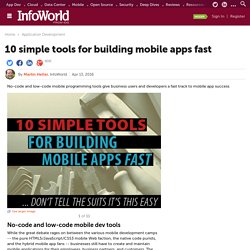
That might seem like an odd combination, but it works well. In addition, EachScape includes mobile back-end services for apps you build with its platform, Web preview for all apps, and an online build service. The architecture that allows EachScape to build iOS, Android, and HTML5 apps from a drag-and-drop editor (the Cloud Studio) depends on blocks and modules, as well as layouts and actions.